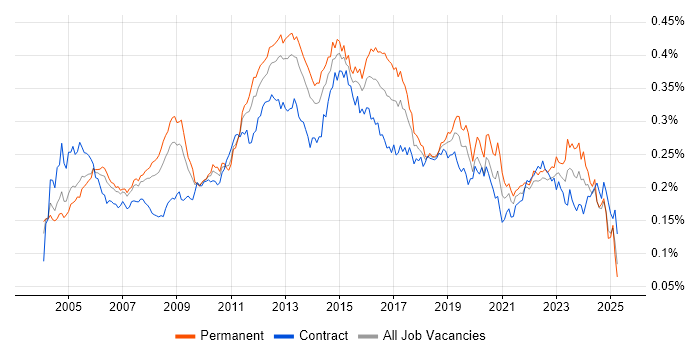Infrastructure Analyst
UK
The median Infrastructure Analyst salary in the UK is £45,000 per year, according to job vacancies posted during the 6 months leading to 1 May 2025.
The table below provides salary benchmarking and summary statistics, comparing them to the same period in the previous two years.
| 6 months to 1 May 2025 |
Same period 2024 | Same period 2023 | |
|---|---|---|---|
| Rank | 621 | 664 | 757 |
| Rank change year-on-year | +43 | +93 | +106 |
| Permanent jobs requiring an Infrastructure Analyst | 71 | 233 | 232 |
| As % of all permanent jobs advertised in the UK | 0.14% | 0.24% | 0.22% |
| As % of the Job Titles category | 0.15% | 0.25% | 0.24% |
| Number of salaries quoted | 54 | 197 | 200 |
| 10th Percentile | £36,250 | £32,500 | £31,250 |
| 25th Percentile | £41,250 | £35,750 | £36,750 |
| Median annual salary (50th Percentile) | £45,000 | £45,000 | £47,500 |
| Median % change year-on-year | - | -5.26% | +5.56% |
| 75th Percentile | £68,750 | £65,000 | £65,000 |
| 90th Percentile | £80,000 | £75,000 | £67,500 |
| UK excluding London median annual salary | £43,750 | £40,000 | £38,500 |
| % change year-on-year | +9.38% | +3.90% | -6.10% |
All Permanent IT Job Vacancies
UK
For comparison with the information above, the following table provides summary statistics for all permanent IT job vacancies. Most job vacancies include a discernible job title that can be normalized. As such, the figures in the second row provide an indication of the number of permanent jobs in our overall sample.
| Permanent vacancies in the UK with a recognized job title | 46,902 | 93,183 | 95,132 |
| % of permanent jobs with a recognized job title | 90.12% | 94.62% | 91.53% |
| Number of salaries quoted | 27,275 | 66,883 | 59,840 |
| 10th Percentile | £30,000 | £28,500 | £32,500 |
| 25th Percentile | £42,000 | £38,500 | £45,000 |
| Median annual salary (50th Percentile) | £57,500 | £52,777 | £60,000 |
| Median % change year-on-year | +8.95% | -12.04% | - |
| 75th Percentile | £75,000 | £71,250 | £81,250 |
| 90th Percentile | £97,500 | £90,000 | £100,000 |
| UK excluding London median annual salary | £52,000 | £50,000 | £52,500 |
| % change year-on-year | +4.00% | -4.76% | +5.00% |
Infrastructure Analyst
Job Vacancy Trend
Job postings that featured Infrastructure Analyst in the job title as a proportion of all IT jobs advertised.

Infrastructure Analyst
Salary Trend
3-month moving average salary quoted in jobs citing Infrastructure Analyst.
Infrastructure Analyst
Salary Histogram
Salary distribution for jobs citing Infrastructure Analyst over the 6 months to 1 May 2025.
Infrastructure Analyst
Top 15 Job Locations
The table below looks at the demand and provides a guide to the median salaries quoted in IT jobs citing Infrastructure Analyst within the UK over the 6 months to 1 May 2025. The 'Rank Change' column provides an indication of the change in demand within each location based on the same 6 month period last year.
| Location | Rank Change on Same Period Last Year |
Matching Permanent IT Job Ads |
Median Salary Past 6 Months |
Median Salary % Change on Same Period Last Year |
Live Jobs |
|---|---|---|---|---|---|
| England | +19 | 59 | £45,000 | -4.26% | 10 |
| UK excluding London | +92 | 39 | £43,750 | +9.38% | 9 |
| London | +68 | 30 | £65,000 | - | 2 |
| North of England | +52 | 20 | £45,000 | +5.88% | 1 |
| North West | +33 | 14 | £45,000 | -14.29% | |
| Work from Home | +128 | 11 | £65,000 | +54.76% | 6 |
| Scotland | +141 | 10 | £52,500 | -6.25% | 1 |
| Yorkshire | +44 | 5 | £41,250 | +17.86% | 1 |
| South East | +74 | 4 | £37,500 | -1.32% | 3 |
| South West | +85 | 2 | £50,000 | -23.08% | 3 |
| Midlands | +63 | 1 | £45,000 | +12.50% | |
| North East | +48 | 1 | £37,500 | - | |
| East Midlands | +42 | 1 | £45,000 | +12.50% | |
| Wales | +39 | 1 | £40,000 | +23.08% | |
| Isle of Man | - | 1 | £34,500 | - |
Infrastructure Analyst Skill Set
Top 30 Co-occurring Skills and Capabilities
For the 6 months to 1 May 2025, Infrastructure Analyst job roles required the following skills and capabilities in order of popularity. The figures indicate the absolute number co-occurrences and as a proportion of all permanent job ads featuring Infrastructure Analyst in the job title.
|
|
Infrastructure Analyst Skill Set
Co-occurring Skills and Capabilities by Category
The follow tables expand on the table above by listing co-occurrences grouped by category. The same employment type, locality and period is covered with up to 20 co-occurrences shown in each of the following categories:
|
|
|||||||||||||||||||||||||||||||||||||||||||||||||||||||||||||||||||||||||||||||||||||||||||||||||||||||||||||||
|
|
|||||||||||||||||||||||||||||||||||||||||||||||||||||||||||||||||||||||||||||||||||||||||||||||||||||||||||||||
|
|
|||||||||||||||||||||||||||||||||||||||||||||||||||||||||||||||||||||||||||||||||||||||||||||||||||||||||||||||
|
|
|||||||||||||||||||||||||||||||||||||||||||||||||||||||||||||||||||||||||||||||||||||||||||||||||||||||||||||||
|
|
|||||||||||||||||||||||||||||||||||||||||||||||||||||||||||||||||||||||||||||||||||||||||||||||||||||||||||||||
|
|
|||||||||||||||||||||||||||||||||||||||||||||||||||||||||||||||||||||||||||||||||||||||||||||||||||||||||||||||
|
|
|||||||||||||||||||||||||||||||||||||||||||||||||||||||||||||||||||||||||||||||||||||||||||||||||||||||||||||||
|
|
|||||||||||||||||||||||||||||||||||||||||||||||||||||||||||||||||||||||||||||||||||||||||||||||||||||||||||||||
